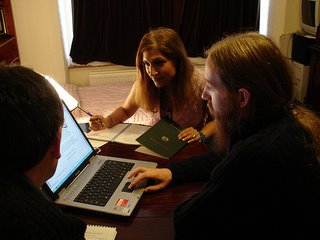On the Role of Religion: From "One Common Faith"
Mona points out in a comment to the post "On Religion: Paradoxical Questions" on this blog that "One Common Faith," a document prepared under the supervision of The Universal House of Justice, addresses "exactly" the subject of the role of religion in society. Pictures with this post are from a photographic set "One Common Faith study weekend" by John Barnabas: "18 Baha'is gathered at the Liverpool Baha'i Centre to study 'One Common Faith' over the weekend 3-4 December 2005." Here is an excerpt from this document: Confusion about the role of religion in cultivating moral consciousness is equally apparent in popular understanding of its contribution to the shaping of society. ...
Confusion about the role of religion in cultivating moral consciousness is equally apparent in popular understanding of its contribution to the shaping of society. ...
Among the most contentious of such issues in understanding society’s evolution towards spiritual maturity has been that of crime and punishment. While different in detail and degree, the penalties prescribed by most sacred texts for acts of violence against either the commonweal or the rights of other individuals tended to be harsh. Moreover, they frequently extended to permitting retaliation against the offenders by the injured parties or by members of their families. In the perspective of history, however, one may reasonably ask what practical alternatives existed. In the absence not merely of present-day programmes of behavioural modification, but even of recourse to such coercive options as prisons and policing agencies, religion’s concern was to impress indelibly on general consciousness the moral unacceptability—and practical costs—of conduct whose effect would otherwise have been to demoralize efforts at social progress. The whole of civilization has since been the beneficiary, and it would be less than honest not to acknowledge the fact.  So it has been throughout all of the religious dispensations whose origins have survived in written records. Mendicancy, slavery, autocracy, conquest, ethnic prejudices and other undesirable features of social interaction have gone unchallenged—or been explicitly indulged—as religion sought to achieve reformations of behaviour that were considered more immediately essential at given stages in the advance of civilization. To condemn religion because any one of its successive dispensations failed to address the whole range of social wrongs would be to ignore everything that has been learned about the nature of human development. Inevitably, anachronistic thinking of this kind must also create severe psychological handicaps in appreciating and facing the requirements of one’s own time.
So it has been throughout all of the religious dispensations whose origins have survived in written records. Mendicancy, slavery, autocracy, conquest, ethnic prejudices and other undesirable features of social interaction have gone unchallenged—or been explicitly indulged—as religion sought to achieve reformations of behaviour that were considered more immediately essential at given stages in the advance of civilization. To condemn religion because any one of its successive dispensations failed to address the whole range of social wrongs would be to ignore everything that has been learned about the nature of human development. Inevitably, anachronistic thinking of this kind must also create severe psychological handicaps in appreciating and facing the requirements of one’s own time.  The issue is not the past, but the implications for the present. Problems arise where followers of one of the world’s faiths prove unable to distinguish between its eternal and transitory features, and attempt to impose on society rules of behaviour that have long since accomplished their purpose. The principle is fundamental to an understanding of religion’s social role: “The remedy the world needeth in its present-day afflictions can never be 38 the same as that which a subsequent age may require”, Bahá’u’lláh points out. “Be anxiously concerned with the needs of the age ye live in, and centre your deliberations on its exigencies and requirements.”
The issue is not the past, but the implications for the present. Problems arise where followers of one of the world’s faiths prove unable to distinguish between its eternal and transitory features, and attempt to impose on society rules of behaviour that have long since accomplished their purpose. The principle is fundamental to an understanding of religion’s social role: “The remedy the world needeth in its present-day afflictions can never be 38 the same as that which a subsequent age may require”, Bahá’u’lláh points out. “Be anxiously concerned with the needs of the age ye live in, and centre your deliberations on its exigencies and requirements.”
Commissioned by the Universal House of Justice, “Confusion about the role of religion in cultivating moral…”, One Common Faith.

No comments:
Post a Comment